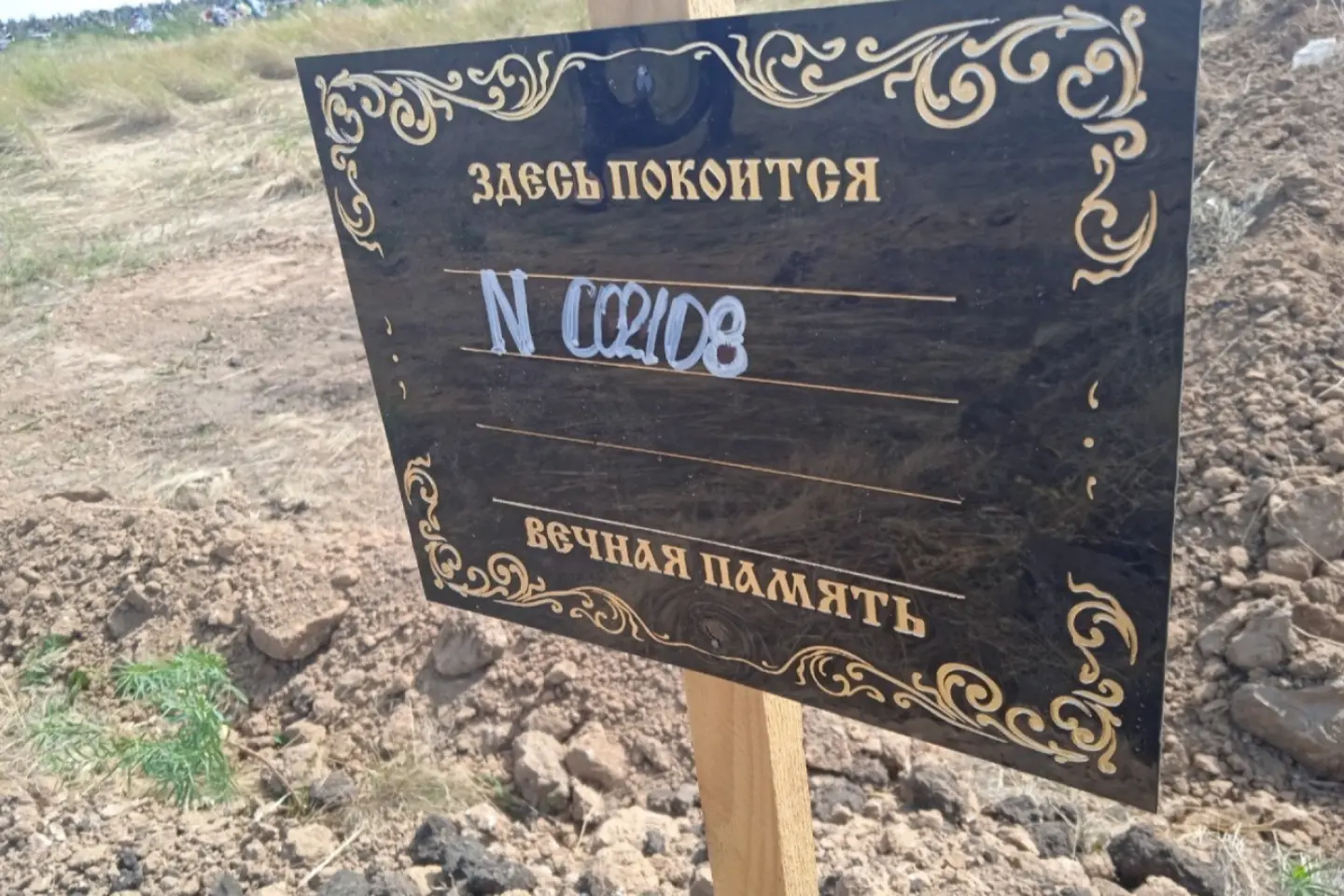
Teenagers and young men in the Russian-occupied territories have been killed or handed long prison sentences for expressing their support for Ukraine. Ukrainian journalists Inna Kubai and Victoria Novikova have documented* several of these cases, which Veridica brings to your attention.
Tigran Hovhannisyan’s grandmother, Raisa, leaves town every week. There are several cemeteries in Russian-occupied Berdyansk. In a secluded corner, far from the rows of tombstones, lies a lonely grave whose only distinctive marking is a black headstone. It bears a simple number — no name, no photo. Raisa hopes that her grandson, Tigran, a 16-year-old boy brutally murdered by Russian security forces for resisting the occupation, is buried here.
In Russia, such black headstones are used for the graves of those whom the state declares “terrorists”. Today, such graves also appear in the occupied territories. Allegations of “terrorism” against Ukrainian teenagers are multiplying, and children are starting to fill up the prisons.
It is extremely easy to get caught by the occupying authorities. Suffice it to refuse to declare your loyalty to the war against Ukraine or to openly express your pro-Ukrainian beliefs in the territories that Russia calls “its new regions”: Crimea, Donbas, Kherson or Zaporizhzhia. It is for such beliefs that the protagonists of this article were persecuted.
No name, no grave: the chronicle of an execution in Berdyansk
The tragic story of Tigran Hovhannisyan and his peer, Nikita Khanganov, quickly made headlines around the world. The boys experienced the beginning of the occupation along with their families in the region of Zaporizhzhia – in the coastal city of Berdyansk, which Russian troops captured on March 1, 2022 and continue to hold to this day.
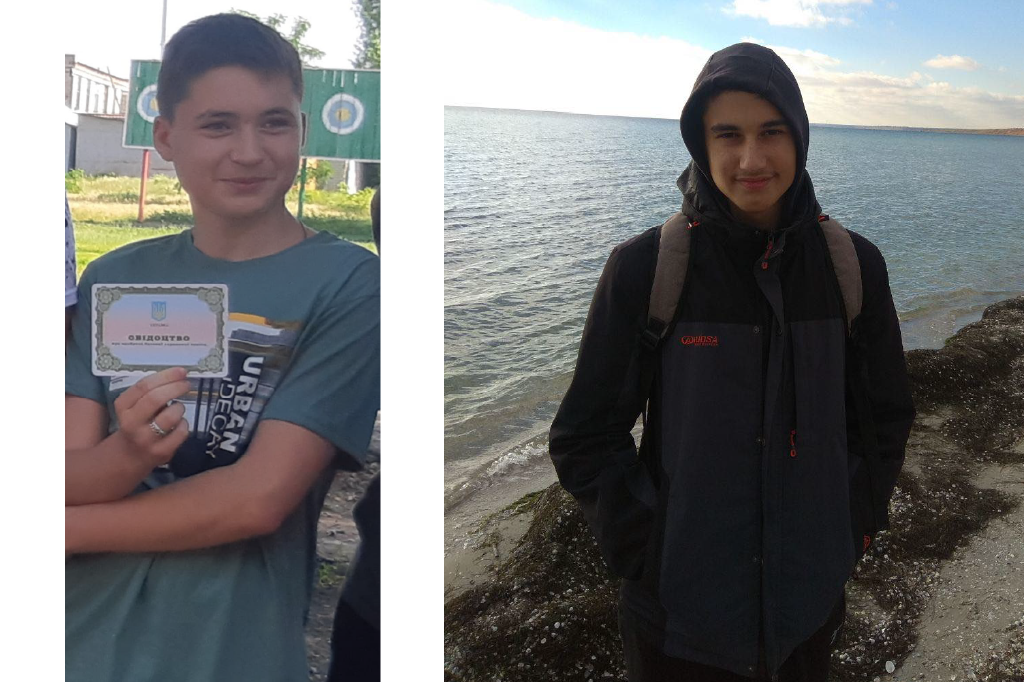
Tigran Hovhannisyan and Nikita Khanganov. Credits: MIHR (Media Initiative for Human Rights)
As in all occupied territories, Russia immediately started to set in place an administration tasked primarily with controlling the civilian population and subordinating social areas – health, education, services. A swift transition to Russian standards was implemented in schools and universities. Ukrainian-language books were confiscated and destroyed, and pro-Ukrainian beliefs became virtually prohibited.
“Tigran always behaved boldly. He was never afraid of the Russian military who were searching the streets for their next victims”, says the boy’s mother, Oksana. Both teenagers (Tigran and his friend Nikita) openly voiced their pro-Ukrainian beliefs from the early days of the occupation. They blatantly refused to study in the occupation school, did not recognize the new authorities and avoided any contact with the Russian administration.
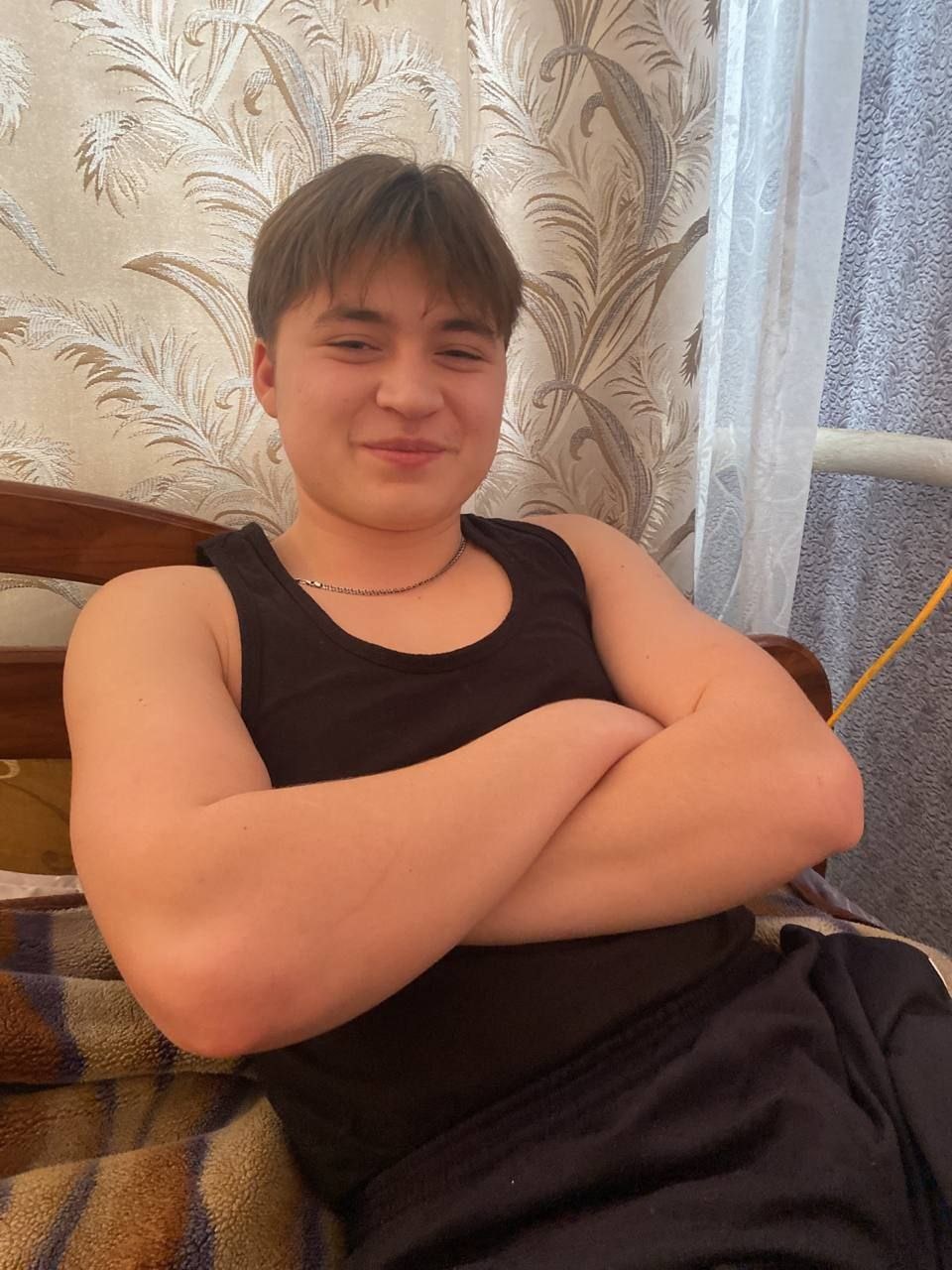
Tigran Hovhannisyan. Credits: family archive
Before long, Russian security forces accused the boys of carrying out acts of sabotage targeting the railways. Numerous searches were carried out in their family homes, and the teenagers were threatened with heavy prison sentences. Starting 2022, Russian special services have been looking for people involved in the resistance movement targeting railway transport. Teenagers have become an easy target in their campaign – it is easier to force them to confess on camera than to deal with the actual partisans.
During the interrogations at the Berdyansk police station, the Russians tried to force Tigran and Nikita to confess. They promised them an alleged “opportunity to leave Russian territory” in exchange for an “honest confession” captured on camera, according to a pre-prepared scenario.
At least twice the boys were taken out on the railway, where they staged the so-called “inquiry experiments”. There, on tape, they were forced to confess to taking part in the sabotage of railway lines. In addition, biological samples, including hair, were taken from the teenagers without providing them with an explanation.
Tigran’s mother tried several times to get her son out of the occupied zone, but her attempts were unsuccessful. Whenever they reached the checkpoints, the Russian military told them that Tigran’s file had been “red-flagged” – his evacuation was practically impossible.
On the evening of June 24, 2023, the irreversible happened: Nikita and Tigran were both shot, the former with a bullet in the head, the latter a bullet in the heart. Some time later, Russian news outlets wrote that “two terrorists had been annihilated”. The circumstances of their death are extremely difficult to ascertain due to the occupation. Tigran's grandmother, Raisa, has visited the scene of the murder several times. All the other relatives are confident: the boys were killed by Russian servicemen.
The families were never given an opportunity to see the bodies. After a year of searching morgues, making inquiries and visiting militia stations, the boys were secretly buried at the far end of the cemetery under black, nameless headstones. The occupation authorities did not provide either death certificates or conclusions about the cause of death.
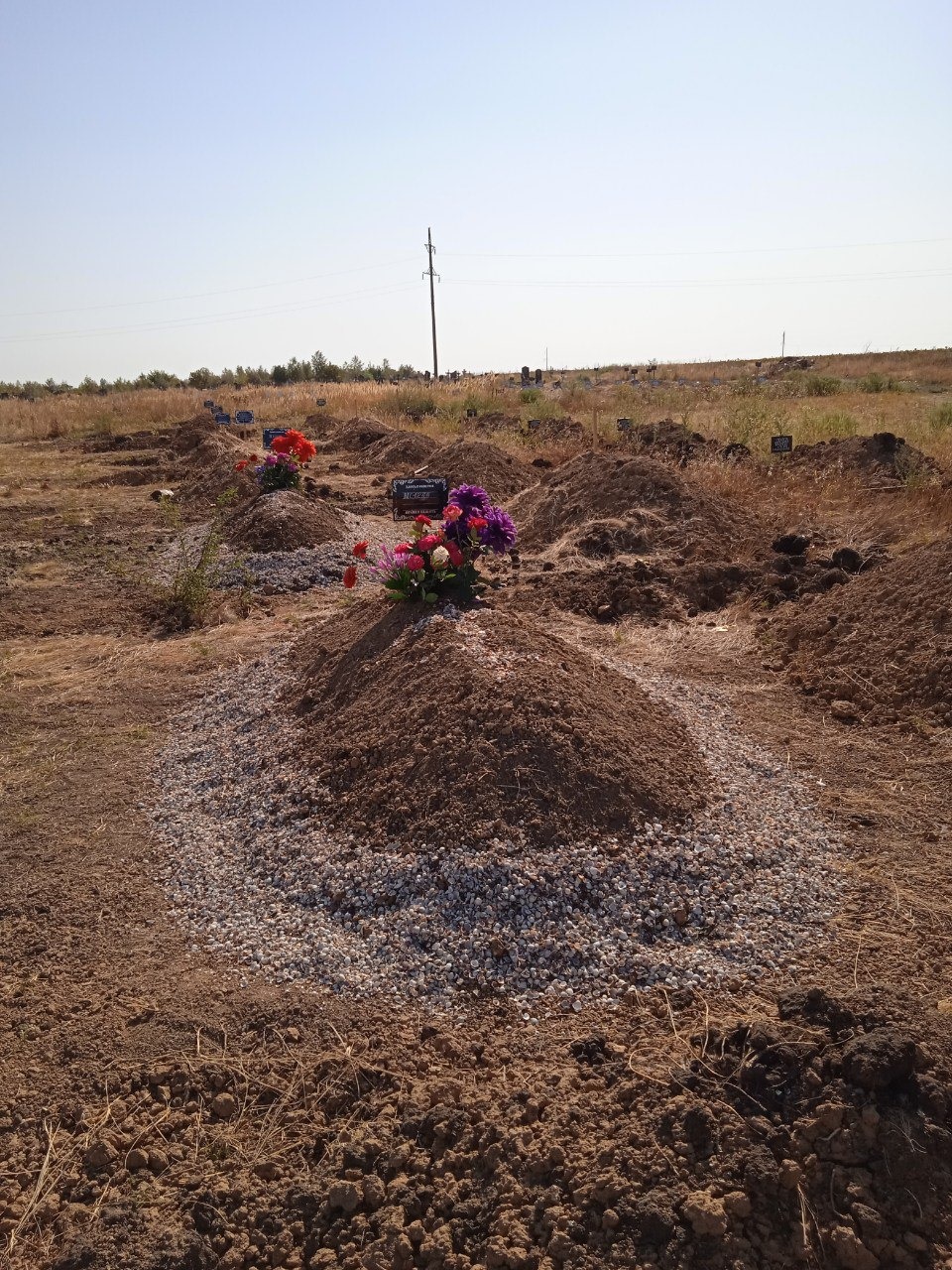
Tigran Hovhannisyan’s grave. Credits: family archive
The murder case was submitted for “investigation” to the same commissioner of the Investigative Committee of Russia who had previously looked into the sabotage “case”.
Young Ukrainians from the Kherson region in the hands of the FSB
In the Kherson region, another two Ukrainian teenagers were declared “terrorists” by the occupation authorities. Yevgeny Hess and Danylo Miroshnichenko from Henichesk were childhood friends, having went to the same boarding school. When the full-scale invasion erupted, they were seventeen and sixteen years old, respectively. They remained in the occupied area, each for their own reasons: one was afraid to leave, the other believed the occupation would be temporary. Both firmly knew who they were.
Yevgeny enrolled in the Kharkiv Aviation Institute, studied remotely, learned English, worked in IT. His relatives recall how the boy would celebrate every blow dealt to Russian troops and did not hide his pro-Ukrainian sympathy. It turned out to be enough to make him a person of interest for the FSB. The agency repeatedly summoned the boy for interrogation, using threats and blackmail to force him to cooperate.
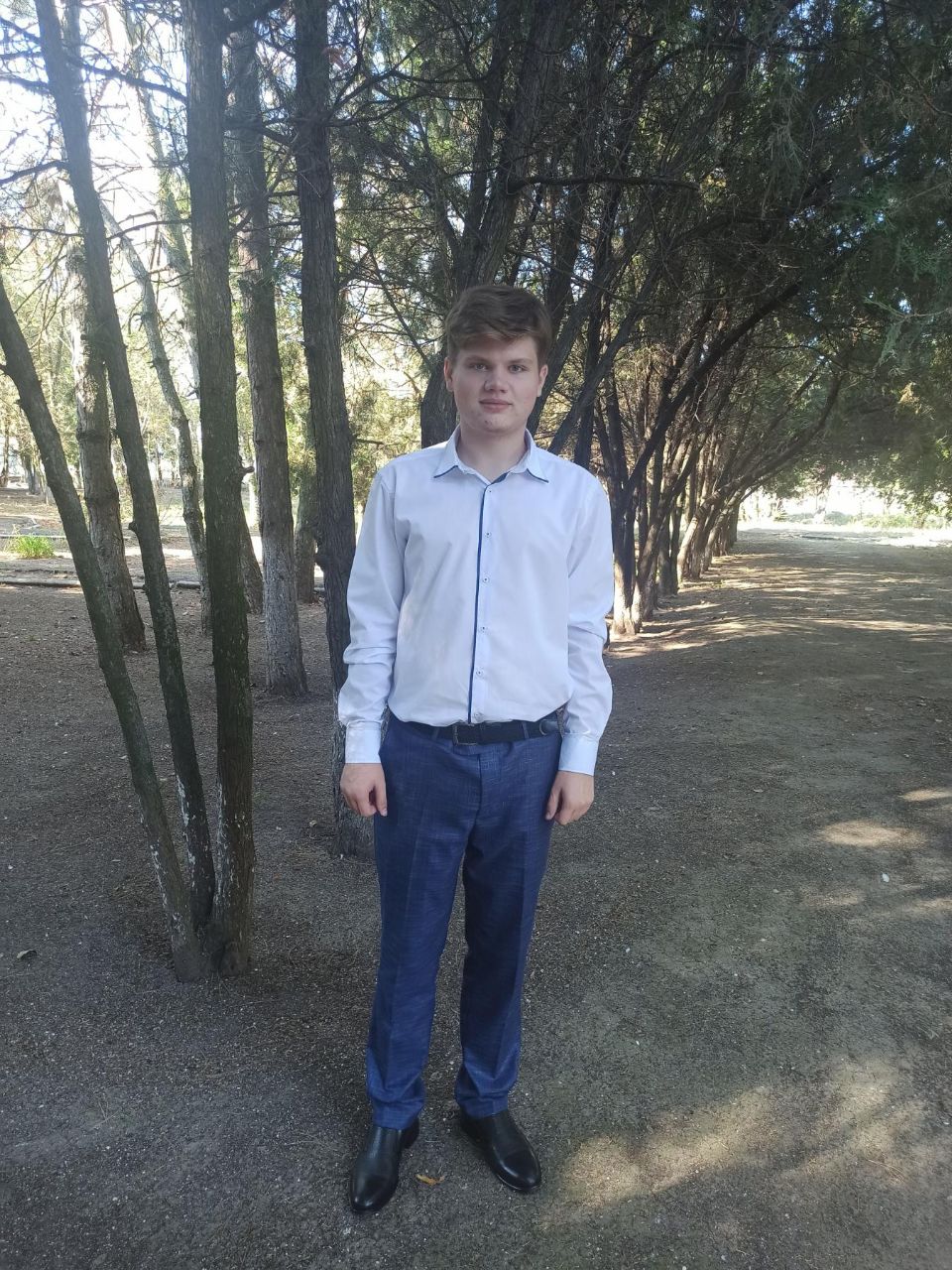
Yevgeny Hess. Credits: family archive
In early 2023, Yevgeny and Danylo were detained on the street and disappeared without trace. The families desperately searched the morgues and police stations. A day later, Yevgeny managed to make a brief phone call: “Everything is fine, I’ll be back soon”. But instead of going home, he was taken straight to detention for ten days, then placed under house arrest, under the strict supervision of an FSB agent. Any message, call or travel plan required prior approval.
The two were forced to “play” the role of spies: to write fictitious letters to the SBU, to request “tasks” and profess their loyalty to Ukraine. All this time they were threatened with a real prison sentence. “Yevgeny resisted, he refused to cooperate, but he was clearly told: play by our rules or go to prison”, his aunt, Natalia, recalls.
A so-called “trial” took place on April 10, 2024 in occupied Henichesk. Yevgeny and Danylo were charged with sabotage, collaboration with Ukrainian special services and possession of explosives. The judges were not interested in either the lack of evidence or the real circumstances. Yevgeny was sentenced to 8 years and 6 months in a max-level prison colony, whereas Danylo was handed a 5-year prison sentence. The reports, the “testimonies”, the “TNT shells” – everything seemed fabricated. The lawyers were FSB-appointed, so the young men had no right to hire independent defense attorneys.
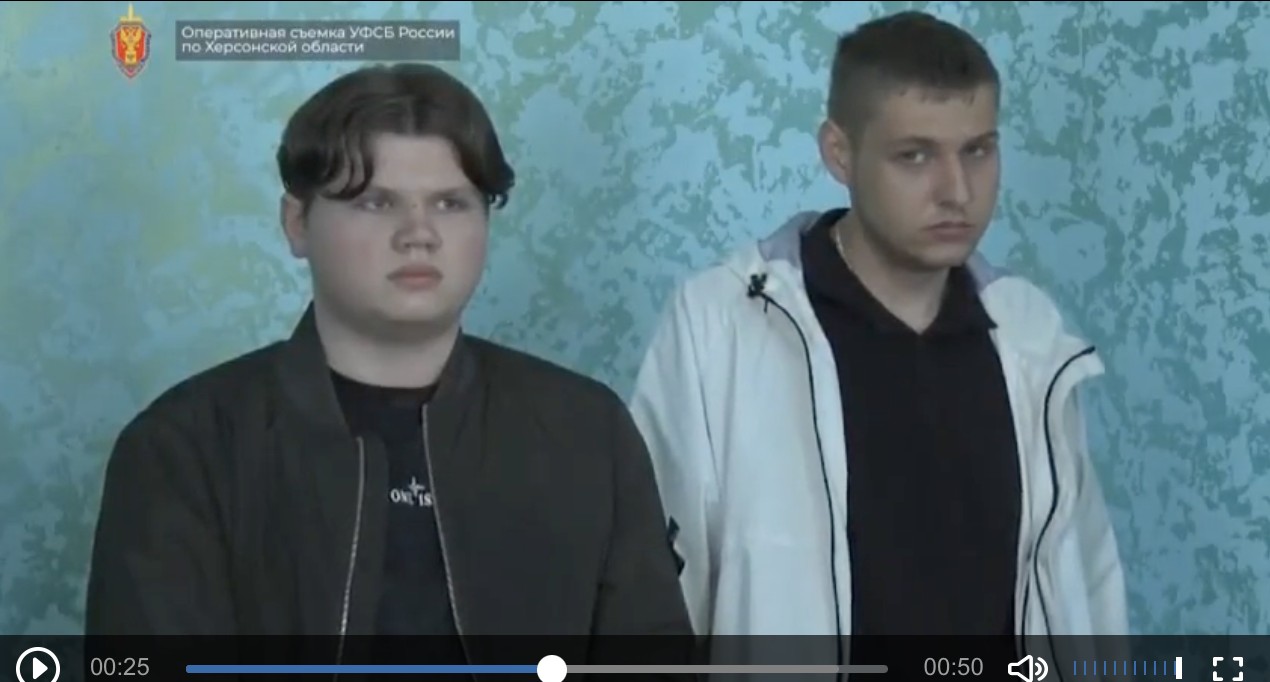
Yevgeny Hess and Danylo Miroshnichenko. Credits: Russian media
“This is typical Russian policy. You stand zero chances in the court of law”, the mother was told when she tried to seek justice.
After the verdict was pronounced, Yevgeny was first put on pretrial arrest in Tsengar, then transferred to Simferopol, Krasnodar, Volgograd and Ulyanovsk. His current place of detention is unknown. The only link was a short letter, which expressed the young man’s exhaustion and despair. “His world is destroyed”, says Natalia.
Much less is known about Danylo’s fate. Preliminary reports indicate that he is serving his time in a colony in northern Russia.
In Ukraine, both boys are officially designated as civilian hostages. But Russia almost systematically refuses to liberate civilians, despite obligations imposed by international humanitarian law.
Young people getting indicted for beliefs and jokes
Dozens of other teenagers and young people became targets of the occupation's repressive machine simply for their beliefs. In May 2023, in Kakhovka, Kherson region, the Russians abducted 18-year-old Kyrylo Rozumey from his home. The pretext was found in his personal correspondence, where the boy mocked the occupiers. After long hours of torture and psychological pressure, he “confessed” to espionage. His sentence was serving 11 years in a prison colony.
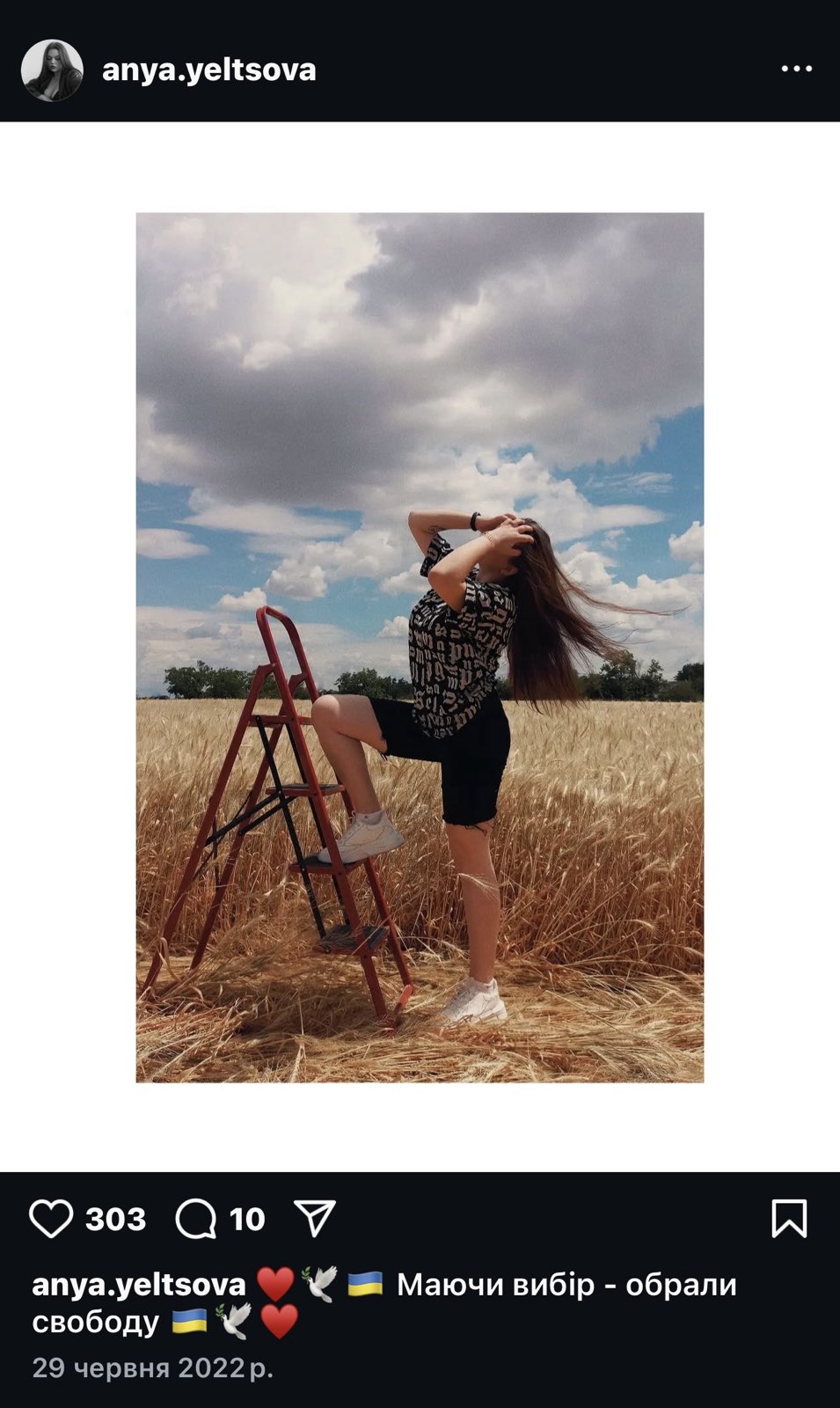
Anya Yeltsova. Credits: social media
20-year-old Ivan Semikoz from Bilovodsk was sentenced to 8.6 years in prison for transferring 50 hryvnias to the “Azov” Ukrainian military fund, whereas Anya Yeltsova, a student from Kherson region – was given a 10-year prison sentence for posting a message on Instagram in which she celebrated the liberation of Kherson from Russian troops. All three were subject to torture, isolation, presented with fabricated charges and brought to court in Rostov - where Hess, Miroshnichenko and dozens of other Ukrainian teenagers are now on trial.
12 years in prison for showing compassion. The story of a Ukrainian student, convicted for a donation
Another young Ukrainian whom Russia designated a “traitor to the state” is Danylo Yefimov from Snizhne, Donetsk region. He was only 18 when Russian security forces detained him at Volgograd airport after discovering that he had donated over $120 to a Ukrainian fund designed to support civilians. The pretext – “treason”. The sentence – 12 years in a high-level prison colony.
Prior to his arrest, Danylo had been studying at a university in Russia for over a year. He lived in a student dormitory, refused to participate in “patriotic events” and publicly condemned Putin’s war. His university instructors and colleagues repeatedly complained about his “anti-state rhetoric”, and his roommate actually testified against him at his trial.
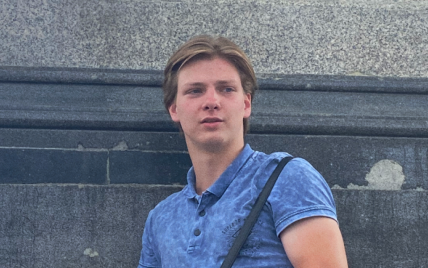
Danylo Yefimov. Credits: social media
After his arrest, Danylo was initially charged with “hooliganism”, for which he was interrogated by the local FSB. The authorities forced him take on a lawyer. While on pretrial arrest, he was beaten and forced to sign confessions. In his prison cell, he was forced to shout “Glory to the Russian Federation” in front of a portrait of Putin along with his colleagues.
Under the pressure of torture and isolation, Danylo was forced to confess. In July 2024, the Rostov court passed his sentence. He was transferred to colony No. 10 in Saratov. From there, he sent a chilling message: “I have heard plenty of stories about torture, executions, hunger, cold, humiliation. God has still been very merciful to me”.
Today, Danylo is a civilian hostage, lost in the thicket of repression. His brother, Kyrylo, says: “Such is the fate of any Ukrainian in the occupied territories. And until these stories are silenced – there will be more to come”.
Put on trial for a made-up act of terrorism
Another tragic story is that of Vladislav Vidlatsky, whom Russia accused of “terrorism”. He was only 17 years old when he was detained by Russian security forces in occupied Melitopol, together with a girl. Several days of utter silence followed. Then, a short message on Telegram – a recording made under duress. In the video, Vlad appears to be reading from a sheet of paper: “I’m home, everything is fine”. In fact, he was held in pre-trial detention center no. 2 in Chonhar, then transferred to Mariupol.
Vladislav was accused of preparing a terrorist act. Along with him, other teenagers were abducted: the Semikopenko brothers and Konstantin Zinovkin. They were all investigated in the same case and put on trial in the occupation court in Rostov. Vlad is sick, kept in isolation, and his family awaits the sentence, afraid and helpless. He has no access to medicine – he needs drugs prescribed by Russian doctors, and those without a Russian passport are denied medical insurance.
“This is more than political persecution. This is a new form of punishment for Ukrainian identity”, says Valeria, Vladislav’s sister.
Russian repression targeting young Ukrainians
No one knows exactly how many civilian hostages are currently detained in prisons across Russia and the occupied territories. According to the Ombudsman of Ukraine, Dmytro Lubinets, their number exceeds 16,000. In the past three years, only 168 people have been released.
However, the persecution of young Ukrainians did not start with the 2022 invasion, but as early as 2014 – with the appearance of the first fabricated cases against teenagers. One of the oldest cases is that of the students from Yasynuvata, Donetsk region: five boys aged between 15 and 17 were sentenced by representatives of the self-proclaimed People’s Republic of Donetsk to sentences of up to 15 years in prison, for alleged bomb attacks and collaboration with Ukrainian special services. The only one who refused to be “pardoned” and said he wanted to live only in Ukraine – Bohdan Kovalchuk – remained in detention, with a prolonged sentence, suffering from lung disease.
These stories are not exceptions to the rule. They do not speak of isolated “cases”, but rather of a systematic practice. Russia is deliberately targeting the Ukrainian identity of teenagers – of those who had the courage to speak out, disobey and refused to betray. They are punished as adults for non-existent crimes, convicted as “terrorists”, and yet their names are still unknown to the world.
*This article was written for Veridica by Inna Kubai and Victoria Novikova jointly with Marin Gherman.


